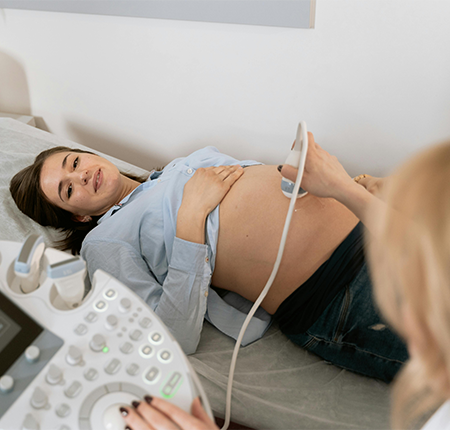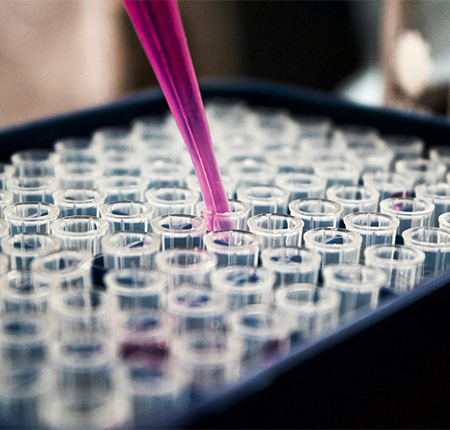
When the pregnancy is confirmed and you know that you are going to become a mother, the health of you and your baby becomes a priority. In this journey, it is very important to have a specialist with you to monitor your pregnancy. Regular visits to the doctor and tests corresponding to each trimester are essential to track and optimize the development of the fetus.
Let's talk about what tests are done in each trimester of pregnancy.
The importance of pregnancy tests
Throughout pregnancy, the mother's body changes and adapts. For the baby to be healthy at birth, the way it develops during the intrauterine period is crucial. For these reasons, it is important that every stage of pregnancy is monitored.
With the help of pregnancy analyzes specific to each trimester, the doctor can follow its evolution and notice any irregularity. Thus, it is possible to intervene in time to optimize the health of the little one and the mother, but also to prevent and treat possible complications.
There are also analysis packages and genetic tests that can be recommended before a pregnancy, to check the health of the mother.
Analyzes in the first week of pregnancy
Early pregnancy blood test
The first signs of pregnancy can appear quite late. Often, women receive the news that they are pregnant quite a while after conception. That's why all pregnant women are recommended the first tests immediately after confirming the pregnancy, including an early pregnancy blood test.
These investigations are aimed at assessing the general health of the mother, and usually include:
- Finding the blood group and the Rh factor
- CBC
- Urine culture and urine summary
- glucose
- Specific tests for communicable diseases (ex: sexually transmitted diseases, HIV, liver viruses, rubella, tuberculosis)
Also, depending on the mother's medical and family history, or if the results of the routine tests already performed are not optimal, the doctor can recommend additional investigations adapted to the mother's particularities.

Analyzes in the 1st trimester of pregnancy
The 1st trimester is the period when the most changes occur in the body. During this period, the most careful monitoring is required, and screening tests are essential to indicate the most likely course of the pregnancy.
If you want to read more about how your baby will develop each week of pregnancy, I told you more about fetal development by trimester HERE .
The analyzes and investigations recommended by the doctor will be adapted according to the state of health of the mother, her history and the particularities of the pregnancy. But in general, there is a standard package of tests recommended for all women in the 1st trimester, and we tell you what they are below.
Obstetric consultation
Obstetric consultation, or gynecological control specific to pregnant women, is the first investigation you will have to do after confirming the pregnancy. If you want to know more about how you can confirm your pregnancy, read our article on how to know you're pregnant .
Following the obstetric consultation, the doctor will identify the risk factors, recommend the set of tests necessary during pregnancy and make a first assessment of it. In short, the first prenatal consultation will give you an approximate answer to questions like "How will the pregnancy go?" and "What steps do I have to take next?".
Also, once pregnant (whenever you go to the doctor for monitoring), the Babeș-Papanicolau cervico-vaginal test is also recommended.
Blood group and the Rh factor
When you are pregnant, it is important to know whether you are Rh positive or negative, as it can affect both the health of the fetus and yours.
If the baby's father is Rh positive, the baby will inherit it. If you are Rh negative, your body will make antibodies against the Rh factor, which can attack the red blood cells of the fetus and cause you to become anemic.
In this case, extra monitoring will be needed during the pregnancy, so it is important that you and the doctor know this from the beginning.
Ultrasound
During the first ultrasound, the doctor can confirm the normal location of the pregnancy. The fetus should develop inside the womb (intrauterine), not outside it. Extrauterine (ectopic) pregnancy will not allow the development of a child and may threaten the life of the mother, and we talked about all its risks in more detail HERE .
Also during the first ultrasound, the gestational age and viability of the embryo will be determined. If you want to calculate your pregnancy by weeks yourself, you can do it roughly using a pregnancy calculator .
This is not the only ultrasound in the 1st trimester. The next one is recommended at 12-13 weeks, and is considered the most important ultrasound of the trimester. The doctor will check that the fetus has a correct conformation, and will be able to identify if there are problems in structural development.
CBC
A very common condition in pregnancy that requires attention and treatment in order not to cause complications such as excessive fatigue or difficult labor is anemia. This occurs either because of iron or folic acid deficiencies, or because of other health problems (eg hemoglobinopathy).
The blood count is the blood test during pregnancy that detects anemia. This measures the level of hemoglobin and other parameters of red blood cells in the blood.
An effective method of preventing anemia in pregnancy is a personalized plan of prenatal vitamins, along with a balanced diet rich in iron. This nutrition should also continue postpartum, during the breastfeeding period, because through breast milk you will transmit the nutrients from your body to the baby. We talked more about nutrition during breastfeeding HERE .
blood sugar
Blood glucose, or glucose level, is also measured during the blood tests. Thus, if the mother unknowingly suffers from type I or II diabetes before pregnancy, or from gestational diabetes, it can be detected and treated early.
Urine summary
Uroculture and urinalysis are another routine test that can identify and treat certain health problems. For example, infections, gestational diabetes, kidney disease and preeclampsia can be identified using this urine sediment analysis.
Tests for sexually transmitted diseases
Many sexually transmitted diseases, including HIV, Syphilis and hepatitis viruses, can be passed from mother to fetus during childbirth. Also, some of them can even affect the evolution of the pregnancy, causing possible malformations or health problems of the baby after birth.
It is recommended that all mothers-to-be be tested for these infections.

Thyroid function
During the first 12 weeks of pregnancy, the baby's thyroid is not functioning. The fetus gets all the hormones it needs from the mother. Even at the end of the first trimester, when the thyroid function of the little one begins to work, it continues to be dependent on the balance in the mother's body.
Thus, if the mother suffers an imbalance in the level of thyroid hormones, the thyroid function of the fetus will also be affected.
Bittest or combined test
The combined test, or bitest, is designed to identify possible genetic problems (or chromosomal defects) of the fetus.
In order to detect such pathologies, the bitest measures the baby's ultrasound parameters (nuchal translucency), the corresponding hormones in the mother's blood (beta HCG and PAPP-A), but also the mother's state of health (age, lifestyle, habits such as smoking, etc. .).
Analyzes in the 2nd trimester of pregnancy
In the second trimester, the pregnancy develops much more visibly. The fetus grows at a faster rate, and measurements can be taken to find out its sex.
At this stage, the risk factors are no longer as strong as in the 1st trimester and the fetus is no longer as sensitive. However, it is still important that the pregnancy is followed. Specific analyzes in this trimester help to detect possible more serious conditions of the baby.
amniocentesis
As the name suggests, amniocentesis is a test that examines a small amount of the amniotic fluid that surrounds the fetus. The purpose of this procedure is to obtain important information about the state of health and its development.
It is a screening test through which the doctor can identify if there is an intrauterine infection and if the baby has genetic diseases or chromosomal abnormalities.
Glucose tolerance
Between weeks 24 and 28 of pregnancy, the glucose tolerance test is performed to screen for gestational diabetes which increases the risk of complications for the mother at birth and morbidity.
The first step for this investigation is to measure your basal blood glucose. After establishing it, you are given 75mg of glucose orally, and your blood sugar is measured again after 1 or 2 hours, respectively.
AFP dosage
AFP dosage, or alpha-fetoprotein, is a type of protein that the fetus's liver produces. Through the placenta, AFP reaches the mother's body and reaches the maximum level of concentration in weeks 32-36.
This can indicate the existence of more serious problems such as spina bifida, structural defects in the abdomen, Down syndrome and other genetic conditions.
Ultrasound of fetal morphology
Between weeks 22 and 24, the fetal morphology ultrasound is performed. This is essential in monitoring the pregnancy because it can identify with an average rate of 56% many conditions and malformations of the baby.
This 2nd trimester morphology is a detailed examination of the baby's organs and how they are developing. Also now, the doctor will analyze the amniotic fluid and the cervix, determine the size and location of the placenta, and monitor the circulation within the mother's umbilical cord and uterine arteries.
Estriol, inhibin and HCG
There are three markers in the placenta that can give the doctor information about the health of the baby. Their concentration in the second trimester of pregnancy can help assess the risk of Down syndrome.
Repeating the usual analyzes from the first trimester
The routine analyzes from the 1st trimester will be repeated in the 2nd trimester as well. We are talking here about the blood count, urine summary and blood sugar, which can indicate the occurrence of infections, diabetes or anemia. The sooner they are detected and treated, the lower the risks of complications will be.
Analyzes in the 3rd trimester of pregnancy
In the third trimester of pregnancy, the risk of conditions that endanger the baby is the lowest. As a result, most often, you will only need to repeat the routine tests you performed during pregnancy at each consultation.
Of course, depending on the problems identified in the first two trimesters, for example if you had an infection or bleeding during pregnancy , your doctor may recommend additional investigations. So the set of analyzes will always be recommended to you depending on the evolution of your own pregnancy, your particularities and needs, and your state of health.
See below which are the most common analyzes in the 3rd trimester of pregnancy.
Screening for streptococcus type B
Strep B is a bacteria that normally lives in the body in healthy adults without causing serious problems. In babies, on the other hand, it can be dangerous and cause death even after immediate treatment.
It is not a sexually transmitted disease, but in women this bacteria is located mainly in the vagina and rectum. Which means it can be passed to the baby during birth. But the risk of transmission to the baby is greatly reduced, to an incidence of 1-2%, if the mother is given antibiotic treatment during labor. That is why it is important that the doctor knows about its existence.
The test for type B strep is called a culture and is done at 36-38 weeks of pregnancy by collecting a small amount of discharge from the vagina and rectum.
Fetal ultrasound with biometry
Between weeks 32 and 34 of pregnancy, the doctor will perform the 3rd trimester ultrasound. This is called fetal ultrasound with biometry and aims to:
Determining the baby's weight and dimensions
Examination of the placenta
Assessment of the position of the fetus in the uterus
Detection of possible abnormalities of the heart, nervous system, muscles or bones
The Doppler examination is also performed, through which the doctor can measure the blood flow of the fetus in certain areas of the body.

Repeating the usual analyses
In general, in the third trimester, the routine analyzes from the 1st trimester and the 2nd trimester are repeated. The urine exam, the bacteriological exam at the vaginal secretion level, the blood count, blood sugar, etc. are repeated.
If you have faced certain conditions during pregnancy, certain specific tests can be repeated or additional investigations can be carried out. The doctor who monitors you will always recommend the right tests according to your particular needs.
Contraction testing
An investigation specific to the 3rd trimester of pregnancy is testing the contractions, in case the baby shows certain conditions. With the help of an analog of oxytocin, the hormone that stimulates uterine contractions during childbirth, the doctor will be able to determine whether a natural birth is possible or whether a cesarean delivery is more suitable.






















